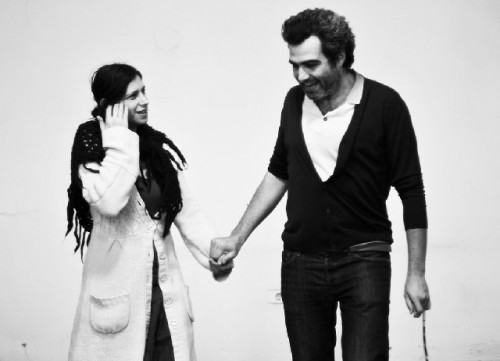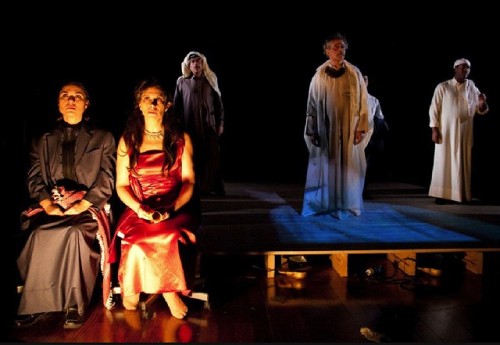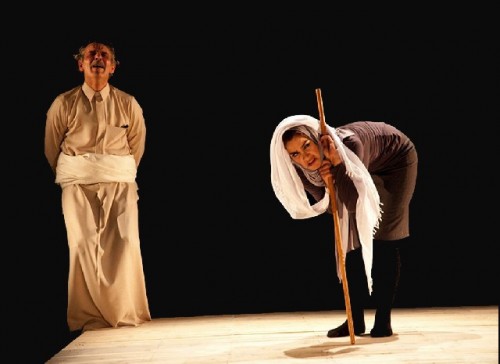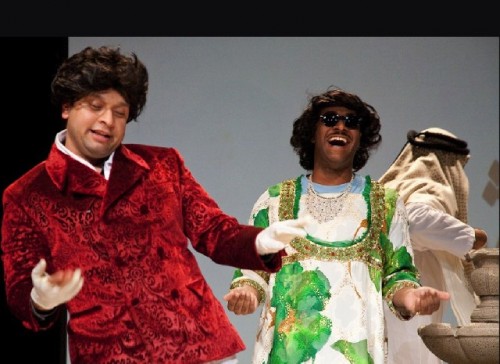Sulayman al-Bassam's The Speaker’s Progress
The Arab Spring Movements at ArtsEmerson Paramount Theatre
By: Nelida Nassar - Oct 14, 2011
The Kuwaiti/ British director and actor Sulayman al-Bassam presents with casual sophistication, charting new territories “The Speaker’s Progress”. The play opened in Kuwait, then Lebanon and is now touring two US cities: New York at the Brooklyn Academy of Music and Boston at the ArtsEmerson Paramount Theatre. Kuwait’s government has supported the work with its avant-garde text uncensored.
Conceived in October 2010, well before the inception of the Arab Spring Movements, it seems in hindsight, that al Bassam’s text is a prophetic one. It is timely addressing the current issues with enthusiasm, passion and a critical eye.
The play is set in a country without identity, immune to the upheavals occurring across the Arab world. A team of renowned researchers of great achievements and high morals are working tirelessly in a laboratory attempting to understand and dissecting a play performed in the sixties, at the height of the country's golden age.
This country is hypothetically destroyed and has since lost its theater that was a platform for dialogue; it feels presently at a loss. Nostalgic for that golden age when people cared about art, they long to restore it. The play’s opening image of a cohesive and cheering crowd crystallizes that moment.
The Ruler Faisal Al Ameeri alias Oum Koulsoum makes a furtive appearance, as the 60’s embodying, unifying symbol that hypnotized the crowd. Al-Bassam defines that moment as “the power of individual memory to catalyze transformational change”. The plot unveils and progresses while the researchers turn into comedians performing with mimicry. They depict the acting of the actors projected on a giant screen. The winds of freedom blow with each of their words and their hand gestures suggest a code of solidarity and revolution. This amazing experience is transformative changing them in the process.
The director and actor reading from a lectern is surrounded by comedians from different nationalities Carole Abboud, Nawar Youssef, Nicolas Daniel, Nassar Al-Nassar, Amal Omran, Fayez Kozak, becomes a spectator as well, wondering about this freedom gained by the people through power struggle, hence also questioning the fate of the theater and its artistic creation. The acting is often contrite, with scatatto movements; noteworthy is the masterful metamorphosis of actress Nowar Yosef from a virginal, innocent maiden to a dominatrix figure. Also, Fayez Kozak performs bravely the role of the Mullah.
Al Bassem encodes while re-contextualizing Shakespeare's Twelfth Night, and recreates a similar sense of pleasure, fun, innocence and dallying with life. The play is a constant interaction between life and theater where the viewer is able to confound reality with fiction. Three recurrent themes freedom, revolution and love are interwoven in leitmotivs and counterpoints of desire and subversion.
With a backdrop of complete self-mockery the audience witness governors’ words vacuity as power alters one’s perspective of life, citizens’ indoctrination and their overreaction, scenes of misunderstood violated freedom as well as the death of censorship. The theatre, temple of truth, becomes a metaphor for the revolution and also for love. The white-gloved hand, an object of seduction, beauty and depravity and an artifice, symbolizes both themes. The glove imagery evolves from the laboratory latex to the silk to end as blood stained.
Sam Collons, the stage designer conceived a tri-dimensional setting that exudes magical moments. Video projection, shadow puppetry simulating hand holding without touching, confluence of light and smoke as well as a spine-chilling metallic sound by Lewis Gibson, are all striking staging devices. A feeling of the stage expansion comes from inclusion of the theatre's stage wings usually concealed from the spectators. The scene changes are effortless, coalescing inventively at an epicenter of luminal space. It is a transgression, something we see without seeing.
Last of the trilogy of Shakespearean plays, The Speaker's Progress in its Arabic title Wa Dar Al-Falak is the adaptation of the third and final play in the trilogy by Sabab - after
previously staging Hamlet and Henry the 3rd. Sulayman al-Bassam’s Arabic reconstruction is of unprecedented realism with its six indecisive while uplifting endings. Wa Dar el-Falak or The Speaker's Progress as its title indicates is a work in progress of 90-minute theatrical performance where the direction and acting are laboratories in a state of change and transformation, full of ambiguities and
great fluidity.
The teleprompter coordination of both the Arabic text and its English translation can gain from a better synchronization. “The spectator in whatever countries he may be will find issues relevant for all, reflecting the tumultuous time we are living in” proclaims Mr. al Bassam.
Boston's theatre scene may benefit from a new wave of experimental and international theatre committed to political and social causes. The question of “how culture engages with government by often becoming complicit of repression” is worth contemplating.
The Speaker’s Progress runs through Sunday October 16 at the Paramount Theatre, 560 Washington Street Boston, MA












